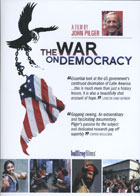
The War on Democracy 2007
Distributed by Bullfrog Films, PO Box 149, Oley, PA 19547; 800-543-FROG (3764)
Produced by Wayne Young
Directed by John Pilger
DVD, color, 94 min.
College - Adult
Human Rights, Latin American Studies, Political Science
Date Entered: 07/25/2008
Reviewed by Michael J. Coffta, Business Librarian, Bloomsburg University of PennsylvaniaThis film examines how Latin American countries are set to “free themselves from a modern form of slavery,” or the influences of U.S. foreign policy. Most striking about the accusations of this film is the absence of any claims of neocolonialism. Rather, noted humanitarian John Pilger claims that the United States industrial elite woos the upper classes of Latin American countries to increase their wealth in unscrupulous ways, and secondly, the U.S. government meddles with these governments, overtly and covertly.
Pilger conducts an exclusive and lengthy interview with Hugo Chavez, President of Venezuela and long time antagonist to the United States. In his outspoken manner, he discusses the issues of private property and poverty in Venezuela. He explains how the country is addressing poverty and making progress with healthcare initiatives. Chavez describes his vision of Venezuela and how it can gain sustainability, not wealth. But is Chavez good for the Venezuelan working class? Critics have claimed that he is “building another Cuba and becoming another Castro.” The War on Democracy gives a detailed account of the 2002 push to remove Chavez, including the violence accompanying his alleged removal.
Pilger illustrates how the “American empire” has manipulated the Latin American nations of Nicaragua, and Chile. The film gives heart wrenching firsthand narratives of human rights violations and conditions of poverty. Pilger also cites the conspicuous and powerful resentment for the United States on the rise in Latin America. More than mere bitterness, Pilger submits that this resentment will lead to grass roots revolutions.
Though this work makes no pretenses of a balanced presentation, it is to be applauded for its extensive interviewing, its selection of government officials (active and retired), and a host of witnesses to tragedies throughout Latin America, and unabashed critical analysis.